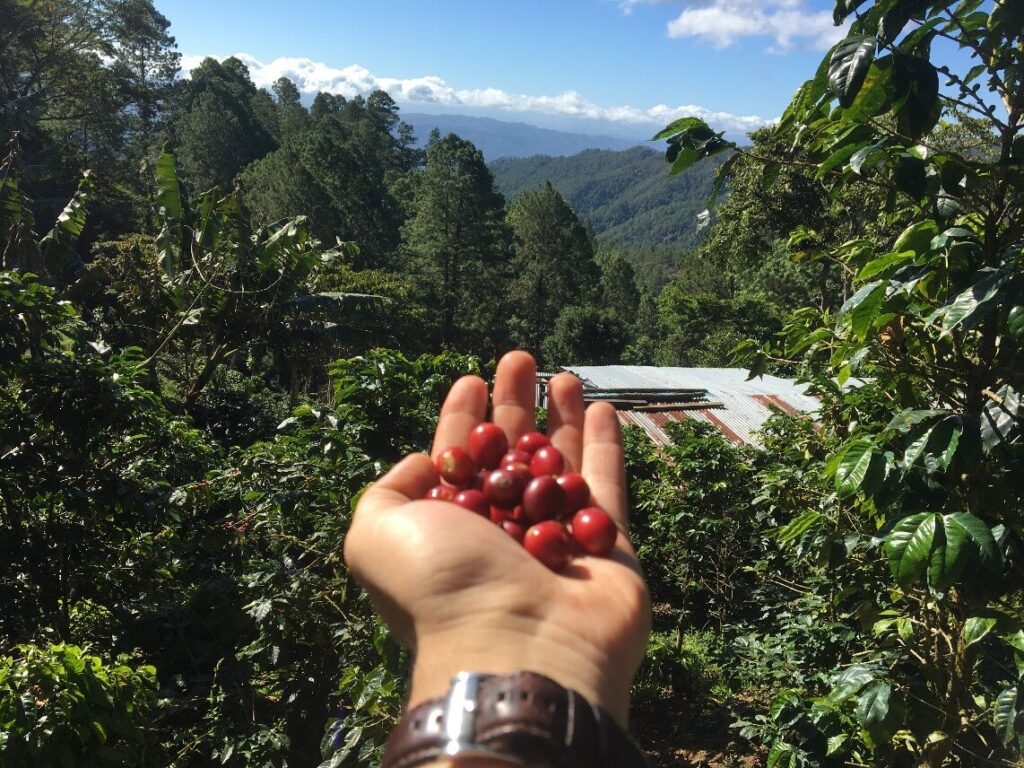Author: Mario Ortez, PhD Student, Purdue University Department of Agricultural Economics
About Mario
I was born and raised in northern Nicaragua in a family of coffee growers. Much of the agricultural sector in my home region is for subsistence, which is why I decided to study agriculture and see how I could help. I majored in agribusiness at Zamorano Pan-American Agricultural School in Honduras and obtained a Master of Science in agricultural economics from Kansas State University in 2015. I later worked at JBS USA in Greeley, Colorado crunching data and pricing beef for about four years until I decided I hadn’t gotten enough schooling. I then came to Purdue University to start my doctoral studies in agricultural economics. If you would like to chat more about our coffee (preferably over a coffee!), feel free to reach out. I can be reached via Twitter at @MarioAmadoOrtez or e-mail at mortez@purdue.edu.

Growing up with coffee growers, I learned to appreciate a regular (made with non-differentiated commodity beans) cup of coffee at the dawn of a foggy morning on the farm when I was very little. It wasn’t until I, my adult self, owned a small coffee plantation that I felt the need to start training to be more of a coffee connoisseur. This training has been a great deal of fun, but it was fundamentally a strategic business decision. Differentiated specialty coffee production opens the door to differentiated sophisticated consumers in markets with high purchasing power. These consumers enjoy learning about what you do on the farm when it comes to harvesting and processing the beans that become the coffee they drink before work or share with friends.
I would bet the shepherd who observed how excited goats would get after eating beans from coffee bush in the highlands of Ethiopia over ten centuries ago (while we don’t really know if this is the true story behind the discovery of coffee, it sounded like a cool one the first time I came across it) did not foresee what today’s amazing world of coffee (commodity and specialty) looks like.
What Consumers Want: Insights to “The Story” of the Products – and the People
There seem to be consistent patterns in what consumers want, at least when it comes to specialty and differentiated foods. You already know the usual ones like affordability, safety from pathogens/illness, freshness, tastiness, etc. But a more recent trend seems to be information — the story of the product you are about to buy. I have had the chance to live in five different countries (including the U.S. presently), and something I’ve found in common from supermarkets in rural Nicaragua all the way to Downtown Chicago is that people want to know where their food comes from.
The buying and selling of goods is enhanced by having complete, easy to digest and easy to access information (on demand!) on where a product came from and how it was produced. A true premium experience will also include by whom a product was produced. In some ways this storytelling is easier back in the little marketplace of Northern Nicaragua because we can just ask the merchants selling the vegetables or grains where they brought their product from. Most often, they would have grown and harvested the products with their own hands. Here in the U.S., unless you are at a farmer’s market, this might be a little more challenging. Product labels, social media, product websites and the like are a way to transfer information from the producer to the consumer.
On our small farm named “Los Celitos” (which means “the little skies”; the farm enjoys a prominent elevation above sea level that sometimes makes you feel you’re close to the sky), we make information about the production and processing of our coffee available through product labels the roaster’s website.
My Own Insights and Lessons Lived
One of the lessons we have learned from the market and applied to “Los Celitos” is that having options, different varieties, roast levels and grind levels is something consumers appreciate. But why? Well, some appreciation stems out of true preference for a specific blend, but many show appreciation because they have started developing a taste for the art of brewing coffee (meaning going beyond the standard coffee maker). For example, if you use a French Press, CHEMEX
® or an espresso maker, you will want different grind levels.
The idea to purchase and develop “Los Celitos” came about from observing the growing market of specialty coffee. We understood coffee growing expertise from our family and the communities where they lived and worked, and we saw how conventional coffee growers constantly struggle to make a living. Those factors combined, we saw an opportunity to decrease the number of intermediaries and connect coffee drinkers with high quality, specialty coffee in a more direct way.
The overall business model we operate under featured initial capital provided by my brother, my uncle and me. My parents operate the farm on-site with the help of many people in the area. We strongly believe that being more strategic in the way we grow and sell agricultural goods in Nicaragua (as is the case in many developing countries where the livelihood of citizens heavily relies on agriculture) will have a positive impact on the overall welfare of the communities where production is occurring (along with enhancing the drinking experience of the consumer).
From my roots in coffee farming, I had the chance to follow the more established and well-worn path of producing conventional coffee. However, I decided that shooting for the specialty, more differentiated coffee was too much fun to pass up. Fundamentally, I’ve taken the chance on specialty coffee and accepted more risk for the chance of higher financial reward. Whether or not the differentiated coffee strategy will be successful, we have yet to see…
ConsumerCorner.2020.Letter.14




